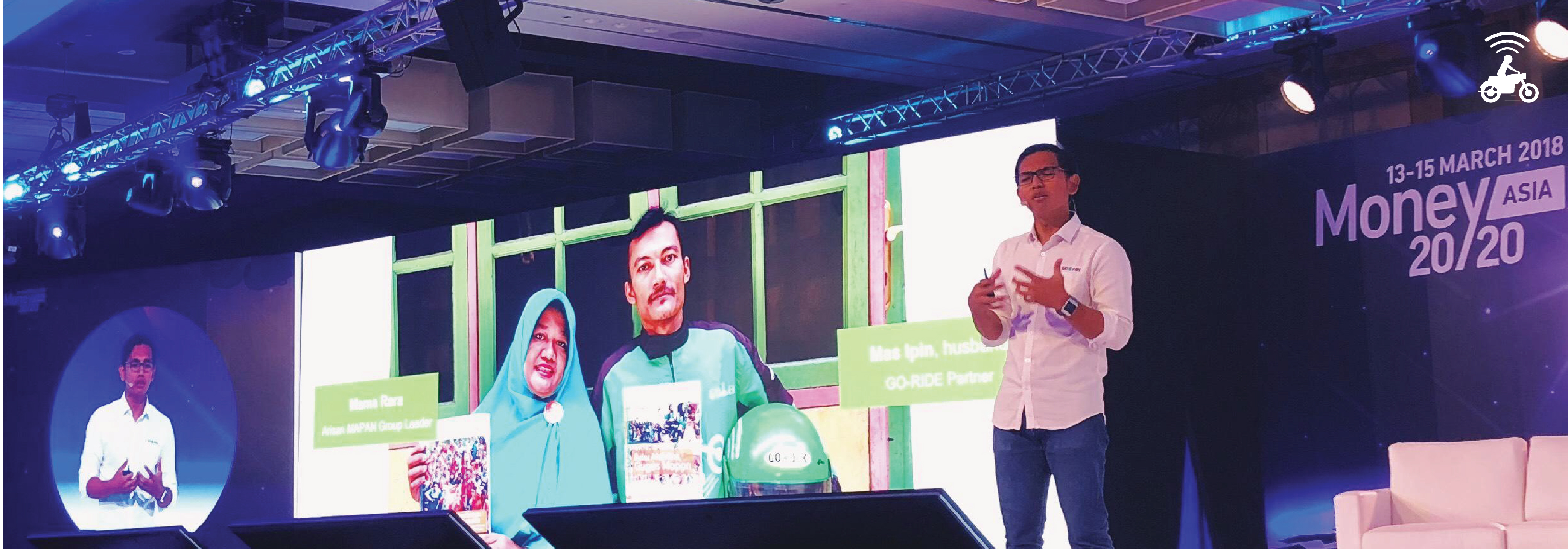
Hi GO-JEKers,
At his keynote for Money 20/20 Asia last March in Singapore, CEO of GO-PAY Aldi Haryopratomo shared his personal story of how when he was a child, his civil engineer father encouraged him to follow on his footstep to build bridges for people in rural Indonesia. His father always believed that those bridges would give access for those who needed them the most. Little did Aldi know that this story would later inspire him empowering social change for the people of Indonesia through MAPAN and GO-PAY.
In the global payments and financial services event, Aldi shared his experience in founding and developing MAPAN, a social enterprise that leverages on the power of communities to enable housewives in rural Indonesia to purchase household goods and other basic necessities in affordable and reliable manner. By forming a group led by a trusted community leader, these women supported each other to obtain their much-needed household goods. As MAPAN grows to reach over 1,5 million members around Java and Bali, Aldi discovered that not only the members are able to help each other, but the massive volume of purchase orders could also change local suppliers’ lives. Soreang, a village of bedsheet producers in West Java had been on the verge of bankruptcy since it had not been able to compete with imported products, despite their high quality and craftsmanship. “Last year, in that one village we gave them fifty thousand orders of bed sheets and six hundred families are making income for making bed sheets now.”
Through this experience of serving the underbanked population, Aldi learns that generally, people can rely on each other to fulfill their financial needs. “That’s how we think about financial services, where it can empower people to help each other. And now, how can we build the bridge to make everyone financed,” ” Aldi added.
This learning is what he aims to bring as a CEO of GO-PAY after MAPAN was acquired by GO-JEK in late 2017.
The collaboration story of GO-JEK and MAPAN came when both companies saw that most of GO-JEK driver partners are man while most of Arisan MAPAN leaders are woman. Based on this thinking, Aldi and CEO of GO-JEK Nadiem Makarim started a pilot project to give the opportunity for husbands and wives to work together, where the wife is a MAPAN community leader and the husband is a GO-JEK driver. “Within three months, a family could go from earning a hundred dollars a month to one thousand dollars a month. Some from becoming the GO-JEK partners and some from partnering with MAPAN. Because we connected the two, we created the value. That is why we (GO-JEK) never thought about ourselves as a ride-hailing company or a food delivery company. It was never really about what industry that we are really going into. It’s about how we can empower people to help each other,” Aldi said.
As the largest transaction platform in the country, GO-JEK promises scale. GO-PAY is the largest digital wallet in Southeast Asia while GO-FOOD is the largest single market food delivery service outside of China. However, what matters more is the potential impact on the entire ecosystem. Every GO-JEK order connects users and partners and enables them to make an impact on each other’s lives. Partners make the user's life more convenient, while users’ orders help increasing partners’ livelihood.
This relationship allows GO-JEK drivers and partners who previously were unbanked or underbanked to access more formalized financial services through GO-PAY. Those completed orders are recorded systematically that help form the basis of credit scoring system for established financial institutions.
“BTN, Indonesia’s largest housing finance bank, has agreed to give loans to GO-JEK drivers so they can buy subsidized housing,” Aldi illustrated. He went further to add “Just yesterday we signed an agreement with BNI, one of the largest financing banks in Indonesia to be able to give KUR, which is a government subsidized loans for entrepreneurs.” Indeed, GO-JEK and GO-PAY recently launched a partnership with BNI to channel said government subsidized loan to GO-FOOD merchants, starting in 4 cities in Indonesia. None of these would have happened without the support of Go-JEK users.
Aldi closed his session by recalling his father’s dream of him building bridges. “I was never a civil engineer and never ended up building real bridges. But I am very happy today, that we are also building a bridge. We are building a bridge from the unbanked to banks; We are building a bridge for bed sheet makers to market they never have an access to; We are building a bridge for a housewife to sell fried chicken to the entire city. But most importantly, we’re building a bridge that empowers people to help each other.”
Read the full script of Aldi’s speech here